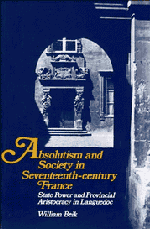 Absolutism and Society in Seventeenth-Century France
Absolutism and Society in Seventeenth-Century France Book contents
- Frontmatter
- Contents
- List of tables
- List of figures
- Preface
- List of abbreviations
- Map: Languedoc in the seventeenth century
- PART ONE INTRODUCTION
- PART TWO THE DISTRIBUTION OF AUTHORITY
- PART THREE THE PROVINCE ON ITS OWN
- 7 Contradictory aspirations and practical problems
- 8 The inadequacy of authority
- 9 The prospects for provincial solidarity
- PART FOUR THE PROVINCE AND THE CROWN
- Conclusion
- Appendix: Breakdown of taxes from the diocese of Toulouse, 1677
- Select bibliography
- Index
7 - Contradictory aspirations and practical problems
Published online by Cambridge University Press: 05 July 2011
- Frontmatter
- Contents
- List of tables
- List of figures
- Preface
- List of abbreviations
- Map: Languedoc in the seventeenth century
- PART ONE INTRODUCTION
- PART TWO THE DISTRIBUTION OF AUTHORITY
- PART THREE THE PROVINCE ON ITS OWN
- 7 Contradictory aspirations and practical problems
- 8 The inadequacy of authority
- 9 The prospects for provincial solidarity
- PART FOUR THE PROVINCE AND THE CROWN
- Conclusion
- Appendix: Breakdown of taxes from the diocese of Toulouse, 1677
- Select bibliography
- Index
Summary
To what extent did the rulers of Languedoc share a common ideological perspective? Viewing the course of political events from their various geographical and institutional vantage points, what did they desire of the king, his government, their society, and what were they afraid of? Information on their attitudes is available in abundance in speeches, letters, and reports, and though most of it is of a highly public nature unlikely to reveal secret antagonisms or seditious inclinations, these stated intentions are nevertheless a good indication of the parameters of their world-view. This diverse body of material reveals both common aspirations and divergences of interest.
COMMON VALUES
The rulers of Languedoc started out with a common frame of reference derived from their social environment. Most of them enjoyed great wealth, belonging to a world of town houses and country estates within which their lives were lived according to familiar patterns of aristocratic courtesy: exchanges of visits and compliments, periodic changes of residence, attendance by ‘courts’ of servants and followers. All were literate, and all spoke and wrote in French, though one suspects that those of local origin were not free from manners that would have struck Parisians as decidedly meridional. More important, all had some access to a humanist–theological education which offered a common frame of reference for discussion of power and morality, though their facility in using it ranged from certain country nobles' smattering of learning to the vast erudition of some prelates and jurists.
- Type
- Chapter
- Information
- Absolutism and Society in Seventeenth-Century FranceState Power and Provincial Aristocracy in Languedoc, pp. 149 - 178Publisher: Cambridge University PressPrint publication year: 1985


